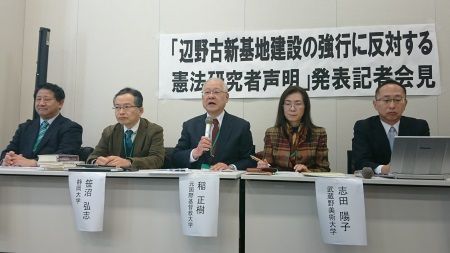131 constitutional scholars speak up against Henoko base construction

On January 24 at House of Representatives in Tokyo, a group of constitutional scholars announced a statement opposing construction of the new base in Henoko.
January 24, 2019 Ryukyu Shimpo
On January 24 a group of constitutional scholars including former professor Masaki Ina of the International Christian University gathered at the House of Representatives in Tokyo and presented a researchers’ statement opposing the forced construction of the Henoko base. As of January 24, 131 constitutional scholars have endorsed the statement.
The scholars who attended the press conference appealed that, “This is a matter of the Okinawan people’s fundamental human rights, and at the same time it is a matter of democracy in Japan.
” They also demanded that construction be halted until the results of a prefectural referendum, which will ask citizens if they support or oppose the Henoko land reclamation, are announced.
According to Ina, this is the first time that volunteer constitutional scholars have issued a statement in regard to the Henoko base construction issue.
There are 500 to 600 constitutional scholars in Japan. Those endorsing the statement continue to recruit advocates.
The statement points out the problem that, “Construction of the new base in Henoko by the Abe administration is a violation of democracy and local autonomy.
” In addition it states, “We must say that the claim ‘Henoko is the only option’ by Abe’s administration is a deception.” Furthermore it details that, “All concerned volunteer constitutional scholars strongly oppose the construction of the new Henoko base in order to leave a peaceful and safe Japan, a Japan with rich nature, to future generations.”
Ina said, “Construction of the Henoko base is a problem for Japanese citizens.
Base construction that overlooks residents’ wishes is contrary to the principle of local autonomy in the Constitution.
” Regarding the prefectural referendum, he said, “It is an important occasion to clarify how people in Okinawa truly feel.”
Hiroshi Sasanuma, a professor at Shizuoka University, emphasized, “It’s an issue that shakes the foundation of democracy. We are wounding and trampling the human rights of Okinawan people by neglecting the Henoko issue and not discussing it as a matter of the entire nation of Japan.”
Professor Yoko Shida of Musashino Art University said, “The opposition of the prefectural people is one way for them to express their will, as guaranteed by the Constitution.
It should never be neglected or ignored.
Forced sediment deposits overstep the limits permitted by the Constitution.” In regard to the results of the prefectural referendum, she said, “The person in charge of political affairs needs to, at minimum, faithfully heed the resulting public sentiment.”
Yuichiro Ishikawa, a professor at Sei Gakuin University, said, “Aside from the rationality of base construction, there are obvious elements of harassment toward Okinawa, alike to sexual violence. The method of forcing the weak with overwhelming power reminds me of various aspects of the current administration, and Henoko appears to be symbolic of that.”
Professor Shigeaki Iijima of Nagoya Gakuin University said, “What the Abe administration is doing in Okinawa is exactly trampling the ‘rule of law.’ They are not qualified to claim to comply with the rule of law against China and others.”
In addition to the Cabinet, the Ministry of Defense, the Ministry of Foreign Affairs, the Self Defense Force, the Okinawa Prefectural Government, and other official agencies, the statement will be sent to all political parties. In the future, the constitutional scholars are considering some sort of appeal activism with proponents of the statement.
(English translation by T&CT and Megumi Chibana)
Previous Article:Camp Schwab rally of 3,000 calls for “no” votes to land reclamation in prefectural referendum
Next Article:Governor gives university lecture: “ You can change politics.”
[Similar Articles]
- Constitutional scholar Setsu Kobayashi: Henoko base construction is flagrant constitutional violation
- Genichiro Takahashi emphasizes importance of Okinawan view of the constitution
- “NO Henoko”: Protesters rally across 32 prefectures, five thousand at Diet
- Constitutional scholar says central government obligated to pursue relocation outside Okinawa
- Iwate’s Prefectural Assembly first besides Okinawa’s to request Henoko land reclamation halt
 Webcam(Kokusai Street)
Webcam(Kokusai Street)


